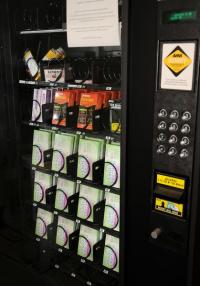Consumers will soon see generic versions of Plan B One-Step on drugstore shelves that will be sold to women and girls of all ages. The US Food and Drug Administration sent letters on Tuesday to two generic manufacturers of the one-pill form of emergency contraception, telling them that they would be allowed to sell their products over-the-counter without a requirement that purchasers show proof of their age.
These generic products will have to be packaged with new labels, however, stating that they are not for use in girls under age 17. That means it may take a few months for them to start appearing in stores alongside condoms, tampons, and Plan B One-Step, which came out from behind the pharmacy counter last July.
“Once a company submits its revised labeling to market a generic version of Plan B One-Step, the agency will work to approve it as soon as possible,” said Erica Jefferson, the FDA’s acting assistant commissioner for media affairs. Older two-pill versions of emergency contraception—taken 12 hours apart—will remain behind the pharmacy counter and can be purchased only by women age 17 and older with valid ID.
Teva, manufacturer of Plan B One-Step, was alerted to the change; it had been granted an exclusivity agreement by the FDA last year after conducting studies to show its product was safe to use in girls ages 15 and over. That agreement, the company hoped, would mean that generic versions of its products would be kept behind the counter for three years with age restrictions.
“The FDA has denied Teva’s request,” Jefferson said. “We determined that Teva’s interpretation of the scope of its exclusivity was too broad.”
Teva declined a request for a comment.
Emergency contraception has engulfed the FDA in a tornado of controversy for several years as women’s rights groups sued to force the agency to make it available over the counter, citing its safety profile and effectiveness at preventing pregnancies in women who have been raped or confronted with a broken condom during sex. FDA officials were ultimately ordered by a federal judge last year to make the product available over-the-counter without any age restrictions.
The FDA consented but only for Teva’s One-Step product.
“This week’s decision means lower cost emergency contraception will be available to women of all ages,” said Martha Walz, president of the Planned Parenthood League of Massachusetts. “As a result, more women will gain access to emergency contraception, and this should reduce the number of unintended pregnancies.”
Plan B One-Step retails for about $50, while the generic versions—Next Choice One Dose and My Way—cost $20 to $35. But the One-Step product label states that it is intended for women and girls 15 and older, while the generic product labels will state that they should be used only by those ages 17 and over.
“I’m very puzzled over this labeling issue,” Walz said. “I don’t know why the FDA would have any differences in labels for a generic” since it’s an identical product to the brand name. Young teenagers reading these labels might be compelled to spend double the amount without realizing that both products are equally safe and effective.
“It’s still going to be confusing for the public,” said Dr. Susan Wood, an associate professor of health policy at George Washington University School of Public Health. Wood resigned from the FDA in 2005 after the agency refused to make Plan B available over the counter. “But it’s another step in the right direction,” she added. “The FDA has gotten itself out of this regulatory tangle.”


